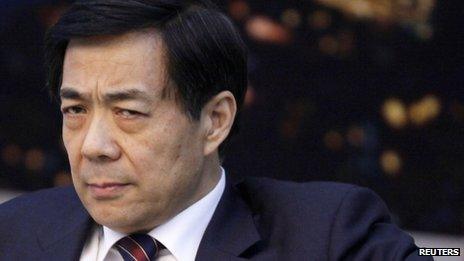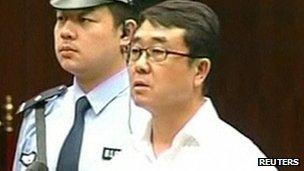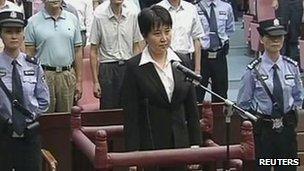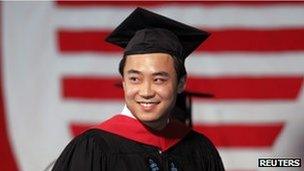Bo Xilai scandal: Timeline
- Published

Bo Xilai was the popular Communist Party chief in Chongqing
Bo Xilai, the former Communist Party chief in Chongqing, was once seen as a high-flyer tipped for top office. But he has been expelled from the Communist Party, parliament and is to face prosecution. His wife was given a suspended death sentence for the murder of British businessman Neil Heywood last year. The BBC looks at how China's biggest political scandal in years unfolded.
14 Nov 2011: Neil Heywood dies in a Chongqing hotel room.
2 Feb 2012: Chongqing city government announces that its popular police chief, Wang Lijun, has been shifted to another job. It is a demotion - and is the first public confirmation that the policeman has fallen out with Chongqing's Communist Party boss, Bo Xilai.
6 Feb: Wang flees to the US consulate in Chengdu, near Chongqing. Many believe he went there to seek asylum. He spends the night at the consulate, which is surrounded by Chinese police.
7 Feb: The police chief is persuaded to leave the consulate after Chongqing's mayor rushes to the scene to talk to him. Wang emerges into the waiting arms of the law and then disappears.
8 Feb: The Chongqing government says that because of over-work Wang is suffering from stress and is now receiving "holiday-style medical treatment". In fact, he is under investigation and in detention.
5-14 Mar: Bo Xilai takes his seat at China's annual parliamentary session in Beijing. He keeps an unusually low profile amid rumours that Mr Wang's actions have tarnished his chances of promotion to the party's politburo Standing Committee later this year.
14 Mar: At a news conference, Chinese Premier Wen Jiabao indirectly criticises Bo Xilai for his handling of the Wang Lijun incident. It is the first comment from a senior national leader on the issue, and shows Mr Bo is in a precarious position.

Wang's flight to the US consulate triggered Bo Xilai's downfall
15 Mar: China announces that Bo Xilai has been removed from his post as party chief in Chongqing. Officials confirm that this is because of the Wang Lijun incident. He disappears from public view.
20 Mar: A leaked audio recording suggests Bo Xilai and his police chief fell out when Wang told his boss of an investigation into Mr Bo's family. Another rumour suggests Mr Bo could be linked to the death of a British businessman, Neil Heywood, who died in Chongqing last November.
26 Mar: UK government confirms it has asked China to re-examine Neil Heywood's death.
10 Apr: China announces that Bo Xilai has been stripped of his Communist Party posts and that his wife, Gu Kailai, and an orderly are being investigated in connection with Mr Heywood's death.
25 Apr: Bo Xilai's son, Bo Guagua, writes an open letter to his university, Harvard. He insists he does not live an extravagant life and says his education has been funded by scholarships and his mother's earnings as a lawyer. He says he has no comment to make about the investigation.
26 Apr: Bo Xilai's elder brother, Bo Xiyong, resigns his post at a state-owned Chinese company in Hong Kong. It was revealed that he was using another name to conduct business there.
26 Apr: The New York Times reports that Bo Xilai ran a wire-tapping network across Chongqing, with his officials even listening in to a phone call involving President Hu Jintao.

Gu Kailai stood trial over Neil Heywood's death
16 May: A group of veteran Communist Party members write to President Hu Jintao, asking him to sack known Bo Xilai supporter Zhou Yongkang. They allege that Mr Zhou, currently in charge of China's security apparatus, is part of a movement to revive the China of Mao Zedong.
23 May: Bo Xilai's name is not included on the list of delegates for the municipality's party conference, an indication of an imminent major reshuffle.
24 May: Bo Xilai's son, Bo Guagua, graduates from Harvard University's Kennedy School of Government in the US.
17 June: Cambodia detains French architect Patrick Devillers, who knew Bo Xilai and his wife, reportedly at the request of the Chinese authorities.
18 June: Chongqing's new leader, Zhang Dejiang, tells a municipal party congress that the Bo Xilai scandal "gravely damaged" the image of the country and the Communist Party.
17 July: Patrick Devillers voluntarily flies to Beijing, where he is said to be wanted as a witness by the Chinese authorities. French diplomats who later meet him say he is in "good shape". It is unclear where he is and if he is under investigation.
26 July: Gu Kailai and her aide Zhang Xiaojun have been charged with "intentional homicide," China's Xinhua state news agency reports.
3 August: Lawyers announce that Gu Kailai will go on trial on 9 August in the eastern city of Hefei for the murder of Neil Heywood.
9 August: Gu Kailai and Zhang Xiaojun go on trial for murder in Hefei. The court says they do not contest the charges, and adjourns ahead of a verdict.
20 August: Gu Kailai given a suspended death sentence for the murder of Neil Heywood. Zhang Xiaojun is given a nine-year prison sentence.

Bo Guagua graduated from Harvard university
5 September: Wang Lijun charged with defection, power abuse and bribe taking.
17 September: Wang Lijun's trial starts in secret in Chengdu.
18 September: Wang Lijun's trial ends.
24 September: Wang Lijun is convicted and jailed for 15 years - a more lenient sentence than expected because he co-operated with the police investigation.
28 September: Bo Xilai is expelled from the Communist Party, and will face justice, according to state news agency Xinhua.
26 October: Bo Xilai is expelled from parliament - removing his immunity from prosecution.
25 July 2013: Bo Xilai is charged with corruption, bribery and abuse of power.
12 August: In a statement to the Wall Street Journal, Neil Heywood's mother, Ann, called on Chinese authorities to offer "substantive" help to her son's family.
18 August: China sets Bo Xilai trial on 22 August 2013 at the Intermediate People's Court in Jinan, Shandong province.
22 August: Bo Xilai trial begins in Jinan.
26 August: Bo Xilai trial ends.
22 September: Bo Xilai found guilty on all charges and sentenced to life by Intermediate People's Court in Jinan.
23 September: Bo Xilai declares intention to appeal against the verdict.
9 October: Chinese court says it will hear Bo Xilai's appeal.
25 October: Court rejects Bo Xilai's appeal.